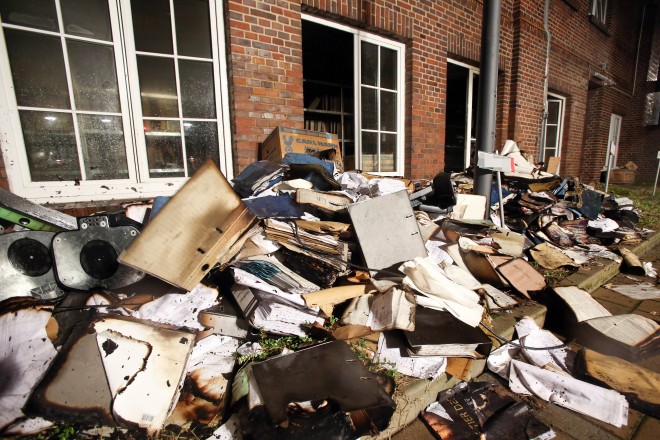German paper that ran Charlie Hebdo cartoons firebombed

Burnt and damaged files are seen in the courtyard of German regional newspaper Hamburger Morgenpost editorial office in Hamburg, northern Germany, on January 11, 2015 after an arson attack. The paper that reprinted Mohammed cartoons from the French satirical paper Charlie Hebdo was the target of an arson attack with rocks and a burning object early Sunday January 11, 2015, but no one was hurt, police said. AFP / DPA / BODO MARKS
Berlin, Germany – A German tabloid that paid tribute to those killed at Charlie Hebdo by reprinting cartoons from the French satirical paper mocking the Prophet Mohammed was firebombed Sunday, police said.
With security services on high alert after a jihadist killing spree in Paris, police in the northern German port city of Hamburg said no one was at the headquarters of the regional daily Hamburger Morgenpost at the time of the attack, which caused only slight damage.
Hamburg police said it was “too soon” to tell whether there was a connection between the Charlie Hebdo tribute and the firebombing, which would be the first attack against the cartoons since Wednesday’s massacre of 12 people at the French weekly.
“Rocks and then a burning object were thrown through the window,” a police spokesman told AFP.
“Two rooms on lower floors were damaged but the fire was put out quickly.”
Article continues after this advertisementThe Hamburger Morgenpost, known locally as the MOPO, had splashed the Charlie Hebdo cartoons on its front page after the massacre at the Paris publication with the headline “This much freedom must be possible!”.
Article continues after this advertisementPolice said the attack had occurred at about 0120 GMT and that two men, aged 35 and 39, seen acting suspiciously near the scene were detained and are being questioned.
The newspaper, which has a circulation of around 91,000, offered regular updates on the firebombing on its website.
“Thick smoke is still hanging in the air, the police are looking for clues,” it said in its initial story, under the headline “Arson attack on the MOPO – Due to the ‘Charlie Hebdo’ cartoons?”.
Later Sunday it had removed any reference to Charlie Hebdo but quoted the regional representative body for the media as calling the attack a “cowardly and insidious act of terror against press freedom”.
Editor-in-chief Frank Niggemeier said in a statement said his team was “shocked that something like this could happen in a cosmopolitan and liberal city like Hamburg”.
He declined to speculate about a motive and said the Monday edition would go to press as planned.
Hamburg is Germany’s second city, with a population of around 2.4 million.
Solidarity with French cartoonists
Several European newspapers ran the cartoons featuring the Prophet Mohammed on their front pages in a gesture of solidarity with the murdered French cartoonists and in defense of free speech.
On Sunday the offices of a Belgian newspaper that published the cartoons were evacuated after it received an anonymous bomb threat, its staff said.
The Hamburg firebombing comes at a time of heightened tensions over the rise of a new anti-Islamic movement in Germany.
The right-wing populist group, “Patriotic Europeans Against the Islamization of the Occident” (PEGIDA), has called for its 12th weekly march in the eastern city of Dresden Monday to be dedicated to “the victims of terrorism in Paris”.
Justice Minister Heiko Maas accused the group of trying to exploit the killings and urged it to call off its rally.
“The victims do not deserve to be misused by rabble-rousers like these,” he told the daily Bild.
On Saturday about 35,000 people, organizers said, took to the streets in Dresden against PEGIDA.
And several Muslim groups have called a silent march in Berlin on Monday to denounce violence and call for social cohesion.
Chancellor Angela Merkel, who was in Paris Sunday for a massive march for the victims, on Saturday addressed members of her party in Hamburg.
She stressed the need for the exchange of security intelligence among Europe’s secret services, particularly between members of the Schengen passport-free zone.
Interior Minister Thomas de Maiziere told DPA news agency the Hamburg attack showed “that we have reason to be concerned and on alert” but he urged caution in assigning blame until the probe was completed.
Hamburg’s Islamist scene came to global attention in 2001 when it emerged that three of the suicide hijackers from the September 11 attacks on the United States, including ringleader Mohammed Atta, had lived and studied in the city.
RELATED STORIES
World leaders join a million in historic Paris march